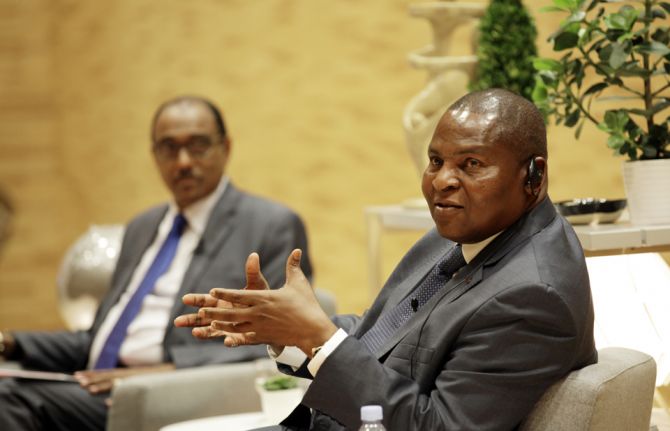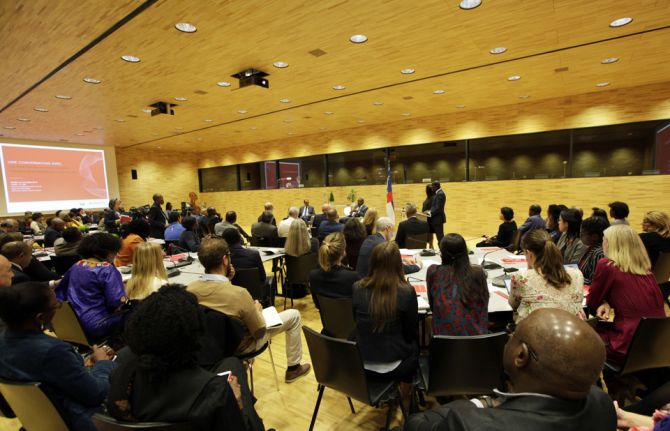


Press Release
The President of the Central African Republic commits to increasing access to basic social services
23 October 2018 23 October 2018UNAIDS' support to Central African Republic lauded by the President
GENEVA, 23 October 2018—The President of the Central African Republic visited UNAIDS to discuss ongoing efforts to rebuild his country, advance national reconciliation and deliver basic services for the populations after decades of political instability and conflict.
"The government is working with its partners to increase access to basic social services like education, health, and clean water as well as boost our HIV response,” said Faustin-Archange Touadéra, President of the Central African Republic. “Our progress remains fragile, this is why we need the support and engagement of all our partners to advance our recovery.”
UNAIDS Executive Director, Michel Sidibé, who visited CAR in early October, thanked the President for his continued commitment towards peace, saying he was encouraged to see pockets of hope. “In your reconstruction efforts, health is a powerful tool to improve social justice and stability,” said Mr Sidibé. “I commend the President for his personal engagement to ensure protection and dignity for all, including women and girls who are vulnerable to sexual violence and abuse.”
UNAIDS and the CAR Ministry of National Defence and Reconstruction of the Army and the Ministry of Health signed a memorandum of understanding (MoU) to reduce gender-based violence and HIV infections within the military and other uniformed personnel, and to increase uptake of HIV treatment, care and support services.
The Central African Republic has the second highest HIV prevalence in central Africa, estimated at 4% in 2017. However, among uniformed personnel, HIV prevalence is double, at an estimated 7.8%. Knowledge of HIV among uniformed personnel in the Central African Republic is particularly low and reports of sexual abuse and violence by military personnel are widespread. Since January 2017, the Central African Republic has seen progress in its response to HIV, with more than 10 000 people accessing life-saving treatment.
The President reiterated that after years of violence, people longed for an end to the suffering. He sincerely hopes that uniformed personnel, armed groups and the government will continue their dialogue to achieve peace with the African Union’s guidance. He repeated, “Now is the time to act to lift up our nation and we thank UNAIDS for their ongoing support.”
HIV data for the Central African Republic in 2017
- 160 000 [130 000–190 000] people were living with HIV
- 53% of people living with HIV knew their HIV status
- 32% of people living with HIV were accessing antiretroviral therapy
- 8700 [7600–11 000] people became newly infected with HIV
- 15 000 [12 000–17 000] people died from AIDS-related illnesses
UNAIDS
The Joint United Nations Programme on HIV/AIDS (UNAIDS) leads and inspires the world to achieve its shared vision of zero new HIV infections, zero discrimination and zero AIDS-related deaths. UNAIDS unites the efforts of 11 UN organizations—UNHCR, UNICEF, WFP, UNDP, UNFPA, UNODC, UN Women, ILO, UNESCO, WHO and the World Bank—and works closely with global and national partners towards ending the AIDS epidemic by 2030 as part of the Sustainable Development Goals. Learn more at unaids.org and connect with us on Facebook, Twitter, Instagram and YouTube.
